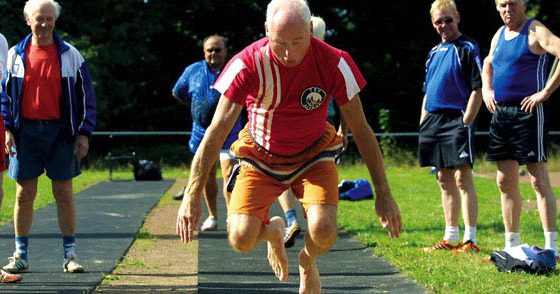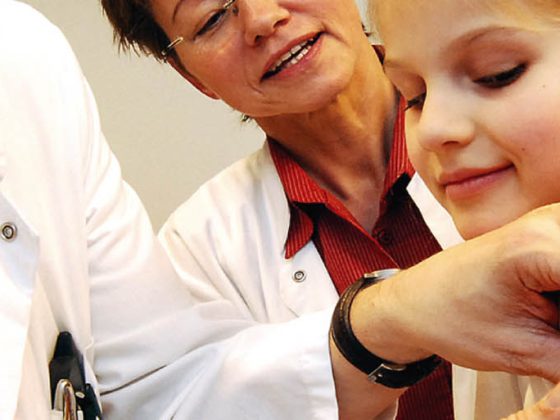Whether it’s after a ride on a merry-go-round, at great heights or after one too many glasses of alcohol: everyone knows from their own experience how it feels to be dizzy. This is precisely what makes it so difficult for the primary care physician to obtain an accurate description of the patient’s condition from the patient who comes to him with pathological vertigo. And yet, careful history taking is the key to successful therapy.
The duration, form, trigger type and accompanying symptoms of vertigo can be differentiated. First, it must be clarified whether the dizziness occurs in attacks or permanently. Is it noticeable as spinning, swaying, or diffuse lightheadedness with blackness before the eyes? Does it show only during movements or also at rest? Is it affected by light sources or noise? In any case, newly prescribed medications must be asked about. Finally, concomitant symptoms (especially headache, visual, speech, sensory, or auditory disturbances) should be assessed [1]. Even with a careful history and physical examination, a definitive diagnosis is not easy. Causes of dizziness are extremely diverse. Basically, a distinction can be made between peripheral vertigo, which is caused by damage to the vestibular organ in the inner ear, and central vertigo, which is related to a brain disorder [2]. Most often, the cause lies with the organ of equilibrium, but diseases of the central nervous system or cardiovascular problems as well as psychological problems can also trigger the dizziness. Specifically, the following types can be distinguished:
Benign paroxysmal positional vertigo (BPLS): the most common form of vertigo is caused by free-floating calcium liches cause the cupula to deflect during horizontal or vertical head movements, resulting in severe spinning vertigo. In most cases, this lasts only a few seconds, or a maximum of one minute. Overnight, when the head lies still, the crystals sediment in the lymphatic fluid and accumulate, so this type of vertigo occurs especially in the morning or after long periods of bed rest. Age is also considered to be a reason for the increasing detachment of particles. The more often you do the movement, the less frequent the dizziness becomes. Storage training is therefore useful. It is important to educate the patient that this form of vertigo, although unpleasant, is benign and has a very high chance of cure. In addition to independent positioning training of the patient (e.g., according to Brandt and Daroff 1980), the specialist can also remove the particles from the archways by a so-called reduction maneuver (e.g., according to Epley 1992 or Semont 1988), which accelerates healing [3, 4]. In 5-10% of affected individuals, such maneuvers cause such severe nausea that drug therapy with dimenhydrinate becomes necessary [5]. Usually, the dizziness disappears by itself after a few weeks.
Persistent severe spinning vertigo (neuronitis vestibularis): an acute unilateral failure of the vestibular organ, probably due to viral infection (herpes simplex), or circulatory disturbances in the inner ear [2, 5]. The exact causes, however, are still unclear. Severe spinning vertigo lasting several days occurs even at rest and is usually accompanied by nausea, vomiting, and sweating. The discomfort increases rapidly in the first few hours. There is a risk of the patient tipping over onto the affected side. Treatment is with medications (time-limited treatment with cortisone preparations), which can achieve relief in the first few days [2]. Intensive balance training promotes the regression of vertigo within a few weeks.
Ménière’s disease: attacks of rotary vertigo occur intermittently and irregularly, usually during several hours. They are accompanied by nausea and unilateral hearing loss and ringing in the ears. The cause is endolymphatic hydrops. It is thought that excessive pressure on Reissner’s membrane causes fluid mixing (endolymph and perilymph) in the inner ear, which temporarily paralyzes the weight organ [6]. Seizures can be lessened by bed rest and antiemetics. Betahistine can be used for permanent therapy (3× 48 mg/day for at least six months). In very severe cases, about 1% of affected individuals, permanent elimination of the organ of equilibrium by means of an antibiotic injection (gentamicin) should be considered [5].
Vertigo migraine: This is a special form of migraine. The dizzy spells, which last for hours to days, are accompanied by headaches in a good two-thirds of patients. If these do not occur, noise and light sensitivity are accompanying symptoms. Women between 20 and 50 years of age and those in menopause are particularly affected. Many of the patients had classic headache symptoms when they were younger. With increasing age, dizziness is now suddenly in the foreground. Eye movement examination is significant in differential diagnosis (central brainstem diseases). For prophylactic therapy, drugs can be used that also reduce the frequency of attacks in classic migraine (beta-blockers, valproic acid, topiramate) [2, 5].
Interdisciplinary cooperation is required
In addition, dizziness exists as a symptom of mental illnesses such as anxiety disorders, panic disorders and depression, or is caused by standing up quickly and traveling by car, bus, ship, train or plane. Dizziness when sitting up is often related to a drop in blood pressure, which can be triggered by agents for arterial hypertension, Parkinson’s disease medications (e.g., dopamine agonists), or psychotropic drugs [5, 6]. Traveler’s dizziness is caused by the eyes perceiving movement, but the vestibular organ reporting a state of rest to the brain. In altitude vertigo, it is the same principle, but in reverse: the body reports movement, but the eyes no longer perceive it because of the long distance to the ground. In both cases, either medications and chewing gum – some of which are herbal – or certain behavioral exercises that help reduce the dizziness are helpful [2, 6].
Precisely because dizziness is so diverse in its manifestations and causes, it makes sense for doctors and therapists from numerous disciplines to join forces and work together more closely. Interdisciplinary dizziness centers already take advantage of such synergies.
Literature:
- Gärtner M: Vertigo assessment in practice. Correct diagnosis for vertigo made easy. HAUSARZT PRAXIS 2013; 5: 32-36.
- Federal Ministry of Education and Research: The con. Research – Diagnosis – Therapy. Möller Druck und Verlag: Berlin 2011.
- Schade A: Benign paroxysmal positional vertigo. Switzerland Med Forum 2011 Jul 25; 29/30: 765-769.
- Münsterlingen Cantonal Hospital, Neurology: Paroxysmal positional vertigo. www.stgag.ch/kantonsspital-muensterlingen.html.
- Strupp M (Interview): Which medication for which dizziness? Ars Medici 2007; 10: 496-499.
- Fact Sheet Vertigo. Types, causes and treatment methods of different types of vertigo. Health Tip 2007 January. www.ktipp.ch/service/merkblaetter/detail/d/schwindel/
HAUSARZT PRAXIS 2013; 11(10): 7-8











